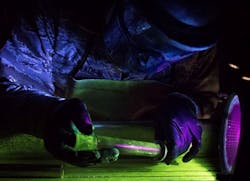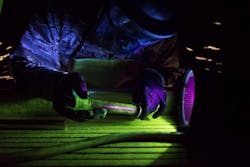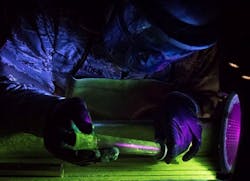U.S. Air Force inspects aircraft parts for cracks, imperfections that can compromise integrity, safety
By Air Force Airman 1st Class Rhett Isbell, 19th Airlift Wing
LITTLE ROCK AIR FORCE BASE, Ark. Gloved hands pull a vital aircraft component from glowing, toxic pools of chemically laced liquid designed to reveal otherwise unseen dangers. A nondestructive inspection airman searches for cracks capable of taking down an aircraft by analyzing the suspect piece with eyes specially trained for the job.
Air Force Airman 1st Class Tye Braden, 19th Maintenance Squadron nondestructive inspection journeyman, inspects an aircraft part at Little Rock Air Force Base, Ark., 11 April 2018. Black lights are used to show liquid penetrant identifying cracks during inspections. (Air Force photo by Airman 1st Class Rhett Isbell)
Airmen from the 19th Maintenance Squadron’s nondestructive inspection shop perform aircraft integrity checks at set intervals and upon request, using liquids and a variety of other methods to assist them in searching for cracks in aircraft parts and other imperfections.
“NDI’s mission is to test aircraft and aircraft parts for integrity purposes and structural health,” says Air Force Airman 1st Class Tye Braden, the maintenance squadron’s nondestructive inspection journeyman. “We deal with a lot of minute problems; if you mess up, a lot can go wrong. If you miss a crack, it can keep expanding, and a wing can fall off.”
The airmen use specialized equipment to see cracks imperceptible to the naked eye -- cracks as small as one-tenth of an inch. They scan the aircraft for faulty elements, with some items located inside the aircraft.
“We work with engineers to figure out which parts of the plane need to be scanned,” said Air Force Staff Sgt. Joe Hayes, the squadron’s assistant noncommissioned officer in charge of the NDI shop. “We do a little bit of everything to verify the integrity of the materials we scan.”
This verification process involves using scanning techniques such as ultrasonic waves, fluorescent penetrant, magnetic particle inspection, radiography and eddy current. NDI airmen scan more than 2,000 parts a year using these techniques.
Harsh chemicals, electric currents, sound waves or even X-rays are employed regularly for inspections to ensure the structural integrity and health of aircraft.
Identifying and mitigating problems before they become crises assures that aircraft remain mission ready.


